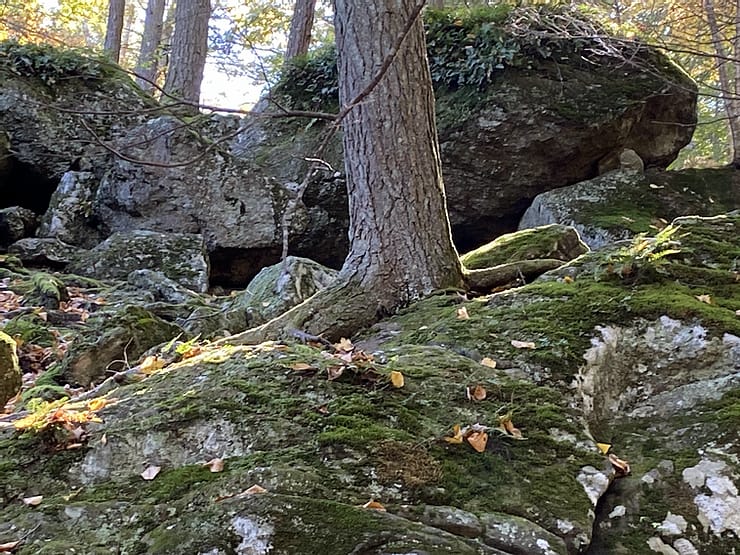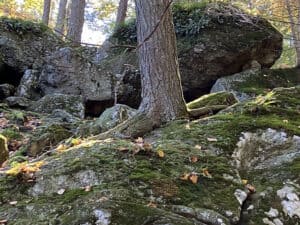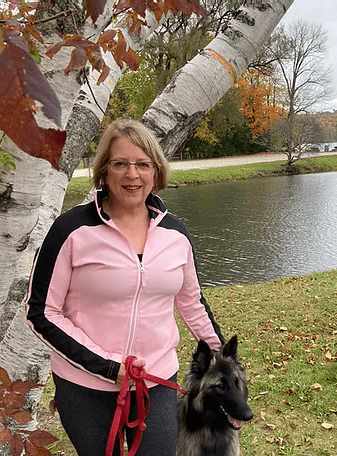Our Environment, Animal Tips & the Great Outdoors

Forest Bathing, Seriously? Yes!
by Melanie McGinn, RN, MBA, CHC, Founder of Health Through Time Nurse Consulting and Coaching
Had you asked me a month ago if I would ever write a blog post on forest bathing, that would have been a definitive no. I am very open to Eastern, Western, and alternative modalities to ease stress, anxiety, and improve overall wellness, but forest bathing? Here in Connecticut where I live, most of us are surrounded by forests. My initial thought was aren’t we already bathing in forests for the greater portion of our days? Isn’t forest bathing just being in nature, going for a hike, or a walk in the woods? My first inclination was forest bathing is a bit over the top and just a new buzzword for selling guided walks. (Ka-Ching!)
What piqued my interest enough to research the topic was a very short conversation overheard while browsing in a local gift shop. The discussion was about the influx of New Yorker’s into Connecticut since the start of the Covid-19 pandemic and that many of them had expressed interest in forest bathing. I chuckled to myself and dismissed the thought. But clearly, forest bathing was not going to be dismissed that readily! While watching a news program this past weekend there was a piece about craniosacral massage being performed under forest canopies as part of a wellness spa service menu. Ok, I give! What’s the hype about the forest bath?
The forest bath is the Japanese practice of Shinrin (Forest) Yoku (Bath) which was introduced in Japan in 1982 to improve health and wellness, by reducing stress and anxiety, and preventing burnout. In Japan the practice encompasses various activities such as walking, yoga, meditation, or even eating in the forest. There have been many research studies about the benefits of Shinrin Yoku or forest bathing. Many of the studies beg further questions and have focused more heavily on the male response to forest bathing. Hopefully there will be future studies that include more women and provide definitive conclusions about how much time is necessary to provide benefit. It would be interesting to learn if the health benefits are cumulative as they are with meditation. Despite the questions raised by current studies the evidence to date is quite compelling. This is a practice worth considering for all of us, male or female.

photo by Melanie McGinn
Clinical testing has shown that forest bathing activates the parasympathetic nervous system. When activated, the parasympathetic nervous system decreases anxiety, improves and stabilizes mood, activates natural killer cells, decreases cortisol production, and decreases blood pressure. This all sounds like a win-win to me! Perhaps this could explain why, according to CT News Junkie, nationwide trail use has increased 200 percent since the onset of the Covid-19 pandemic. Could it be that we may instinctively be drawn to forest bathing?
Intrigued? Ready to give forest bathing a try? Guided experiences are available, and I was quite surprised to learn there is actually a 150-hour certification course for forest bath guides! Who knew!! The good news is you don’t need a guide to try the forest bath experience. Kaiser Permanente and Dr. Qing Li, author of Forest Bathing: How Trees Can Help You Find Health and Happiness offer some great tips on how to reap the benefits of a forest bath at your local park where you can experience trees and nature. As a hiker, I appreciated the Kaiser Permanente safety tips as well.
While forest bathing it is recommended you practice mindfulness and engage your five senses. According to Kaiser Permanente avoid making the forest bath experience “a chore.” Forest bathing is for everyone, you do not need to be athletic, or travel to an exotic forest to reap the benefits. So, save the challenging trail hike for another time. Dr. Qing Li offers practical guidance in his Time article on how you can forest bathe without a guide. He recommends you find the location, it can be a forest, or an area in nature that has significance for you. Once you chose your location, Dr. Qing Li recommends you leave your phone and camera behind. As I occasionally solo hike (and can be quite klutzy) I don’t recommend leaving your phone behind, however, do turn it off and have the phone just in case should you find yourself on a remote trail for your forest bath experience.
Utilize all of your senses!
1. Sight. Take time to look at the trees, notice the leaves, how does the sunlight appear as it filters through the branches? Take in the lush vegetation, look around you without agenda or expectation.
2. Smell. The forest is rich with wonderful fragrances. I particularly enjoy the scent of pine trees, and the earthy smell of dirt or “petrichor.” You may enjoy discovering fragrances that you find particularly soothing or calming. Close your eyes and focus with intention on the scents. You will feel your heart rate calm, your breathing relaxes, and you will find yourself delightfully present in the moment.
3. Taste. Yes, taste the forest! I used to remark to friends that when I used to ride my bike on a particular dirt road I could “taste” the dirt. That “taste” has left a lifelong imprint on me and brings back the joy of a nine-year-old on a bike without a care in the world. Eat your lunch while savoring each bite in your chosen forest bath location.
4. Touch. Touch the trees, feel the bark, each variety of tree offers a unique sensory experience. Feel the moss on the forest floor, reach your hand out and close your eyes, do you feel the breeze, or the warmth of the sun?
5. Listen. Close your eyes and listen, do you hear the wind, or a calm breeze? Maybe you hear the footsteps of a deer, or the rustling of leaves as a squirrel is busy gathering nuts. Perhaps you may hear the gentle yet constant flow of water in a nearby creek.
Though more studies need to be done to determine if there is increased benefit derived from increased time spent engaging in a forest bath, it has been suggested that as little as 20 minutes can provide significant increase in the parasympathetic nervous system response that promotes the positive physical and mental health benefits. The reduction of stress improves the function of every system in your body, and your immune response is improved.
I’ll be the first to admit I initially dismissed the concept of the forest bath. I do believe that time spent outdoors and in nature is very relaxing and can clear your head. I generally take moments to enjoy the sights and sounds, and going forward I will be more mindful and inclusive of engaging all five senses. I just may take a few more moments to not make my entire hike about getting in some exercise, but to just breathe and enjoy the benefits of a forest bath. Who knows, maybe one day I’ll become a certified Forest Bath Guide!

Melanie McGinn, is a registered nurse with over 20 years of experience providing education, guidance, and support to individuals and families enabling them to improve the quality of their lives. Melanie recently received health coach certification from the Dr. Sears Health and Wellness Institute.
As a hospice nurse, Melanie saw first-hand the pain and suffering her patients endured, often for diseases that could have been prevented or minimized through lifestyle choices. These experiences have led her to the desire to share how nutrition, exercise, and how we react to life’s challenges can have immeasurable positive impact on the quality and happiness of our lives.
To learn more about Health Through Time Nurse Consulting and Coaching or read more blogs from Melanie, visit healththroughtime.com


